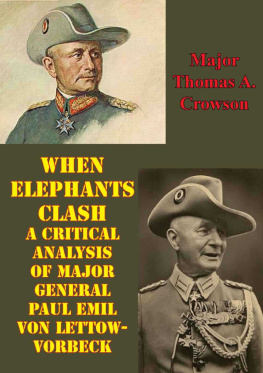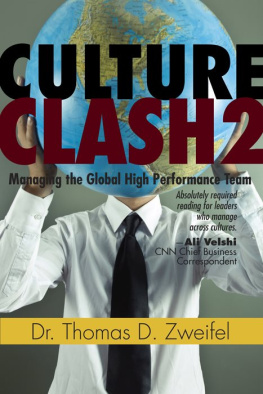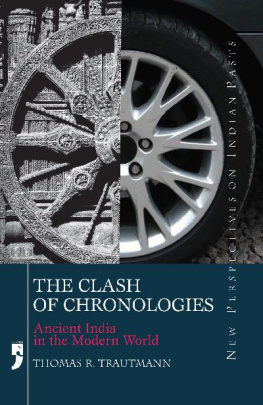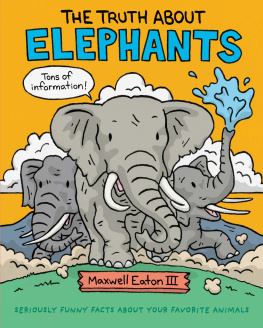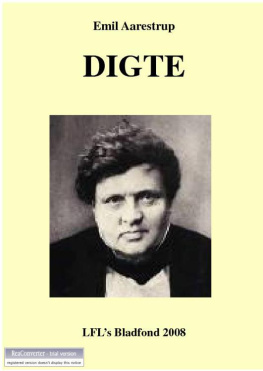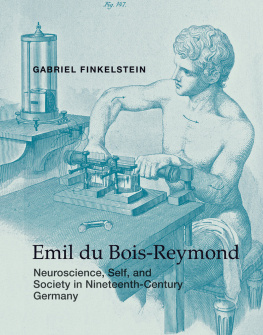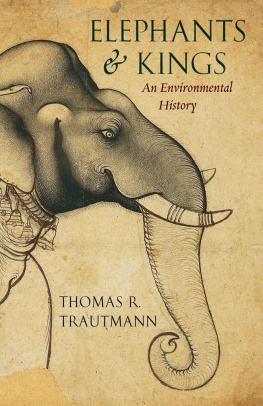This edition is published by PICKLE PARTNERS PUBLISHINGwww.picklepartnerspublishing.com
To join our mailing list for new titles or for issues with our books picklepublishing@gmail.com
Or on Facebook
Text originally published in 2003 under the same title.
Pickle Partners Publishing 2014, all rights reserved. No part of this publication may be reproduced, stored in a retrieval system or transmitted by any means, electrical, mechanical or otherwise without the written permission of the copyright holder.
Publishers Note
Although in most cases we have retained the Authors original spelling and grammar to authentically reproduce the work of the Author and the original intent of such material, some additional notes and clarifications have been added for the modern readers benefit.
We have also made every effort to include all maps and illustrations of the original edition the limitations of formatting do not allow of including larger maps, we will upload as many of these maps as possible.
WHEN ELEPHANTS CLASH: A CRITICAL ANALYSIS OF MAJOR GENERAL PAUL EMIL VON LETTOW-VORBECK IN THE EAST AFRICAN THEATER OF THE GREAT WAR
By
MAJ Thomas A. Crowson.
TABLE OF CONTENTS
Contents
ABSTRACT
For over four years during World War I, Lieutenant Colonel (Later Major General) Paul Emil von Lettow-Vorbeck, commander of the German Schutztruppe led the men of the British East African Expeditionary Force on a chase over some of the most inhospitable terrain imaginable. As the commander of German forces in East Africa, he was the author of one of the most successful guerrilla fights in history. His innovative and creative solutions to daily problems proved to be the undoing of a succession of British commanders, allowing him to bleed Allied forces from European fronts. Although he never had more than 3,000 European and 15,000 native soldiers, von Lettow-Vorbeck consumed the efforts of over 250,000 Allied (mostly British) soldiers. Von Lettow-Vorbeck and the men of the Schutztruppe are little known outside of Germany, but they were never defeated and have the distinction of being the only Germans of World War I to occupy British soil. Despite their successes, their exploits remain obscured in the greater tragedy of the Great War.
CHAPTER 1 INTRODUCTION
It was a hot day, but they were all hot so nobody noticed. The equatorial climate bleached their hair, burnt them red, and sucked all the energy out of their bodies. To add to the discomfort of the British soldiers, sweat ran across their brows and down their necks soaking their shirts and attracting so many flies, chiggers, gnats, and assorted other creatures that at times they could hardly see. Nobody had the energy to swat them or even shoo them away. The beasties were just a factor like the weather and the gnawing hunger that never really left their bellies. Sometimes the ache changed from an overwhelming pain to a dull roar. The Quartermaster supplied the men with coffee beans and flour, but nothing to make these into real food. These rations were supposed to last to the end of the march. But then again, the march was only supposed to last a few days. Flour mixed with water did little to help, but it did plug the crippling diarrhea from which so many soldiers were suffering and dying. So much came out of these wretched men that others would begin to wonder if they actually ate more than every other day. In an effort to lessen the hunger of his men, one captain, in direct violation of standing orders, shot an elephant. His company ate well then, but in the jungle nothing lasts. Everything began to rot within a day. The starving men ate their fill, smoked what they could and left the rest.
As bad as it was for the soldiers, the Askari and porters had it worse. They ate what the British soldiers left behind. The natives were happy to get the trunk of the elephant. There were hundreds of porters with their families carrying upwards of fifty pounds each. Nobody knew what kept them going, but day after day they were there carrying the gear. Earlier, the force had attempted to use horses, but they were no use. The animals died quickly from many of the same diseases that were killing the mendiarrhea, malnutrition, and parasites. The best thing that came from the horses was few good stews and full stomachs. Soon, that was just a memory as well.
Suddenly from the front came the familiar sound of cannon fire. It was one of the guns the Germans had salvaged from their wrecked boat named Knigsberg . British forces had captured one of these giant guns, but the Germans spiked it first. They never left behind anything useful. How they managed to manhandle the big guns into position was a continuous source of discussion over many campfires. These huge naval guns were not meant to be moved by soldiers. Nevertheless, the Germans regularly muscled them into position, propped them up with wood and iron beams, and set them in place to ambush a passing force. The British response was as if it was rehearsed on the parade field. A whistle blew, the commander yelled follow me and off they went. They attempted the standard flanking maneuver, but always the treacherous jungle floor tripped them up when they moved from the relative safety of the trails. It hardly matter anyway. The enemy anticipated every move the British made and a group of German Askari rose up from behind their well-camouflaged positions and fired with murderous precision. At the beginning of the war, nobody could have thought native troops would have been so disciplined or deadly. That belief had changed.
As soon as it started it was over. The British gave chase, but as usual, found nothing. There were a few German wounded evacuated to the rear (these were civilized gentlemen after all) but not much else. The enemy melted into the night leaving ten or more British wounded or dead to their one. The surviving soldiers often did not know whether to envy the wounded or not. For the wounded, the war might be over. It meant moving to the rear and getting some hot food and rest. On the other hand, it could mean their death. In most soldiers minds, a hospital was a disease-infested place full of pain-wracked men and harried doctors doing their best with meager supplies, a place to die. But then again, so was the jungle. They took a few hours to evacuate the wounded and bury the dead, then returned to their never-ending march. It was all supposed to be a big lark; a quick sideshow in the Great War. There was to have been a summer of campaigning in African big game country then back to the real war on the continent. There were not enough German soldiers down there to slow down the British Army. They had been at it for about a year. It did not look like it was going to be over any time soon.
The overwhelming belief among the British soldiers was that the enemy success was the doing of one man: the Commander of German Forces in East Africa, Lieutenant Colonel Paul Emil von Lettow-Vorbeck. They were not far off the mark. Von Lettow-Vorbeck was a creative man whose vastly outnumbered German forces led the British on a chase in the African Bundu for over four years. Despite a lack of food, personnel, weapons, ammunition, and communication with Berlin, Lettow (as he was known to his peers) never surrendered to the British until well past the armistice in 1918. The purpose of this thesis is to examine how von Lettow-Vorbeck held out against the superior British forces for over four years. What skills and personality traits did he bring to his command, how did he use them, why did he continue to fight, and did he achieve his intent?
If one looks for information about the campaign in East Africa during the Great War, he would look in the Other Campaigns chapter. There, lumped in with information on the conduct of the war in the few German colonies in the Pacific and on the West African coast are often a few paragraphs about East Africa. It is unfortunate that more consideration is not given to actions in German and British East Africa. This theater of war was home to exploits that were unheard of on the Western Front. Soldiers in East Africa regularly marched hundreds of miles through some of the most varied and inhospitable terrain in the world between battles. Many of these soldiers were groups of professional hunters or individualists who fought the war in their own manner; almost as if it were sport. In addition to these white hunters, crocodiles, rhinoceroses, bees, baboons, and elephants all added to the confusion of the campaign. The region, which was home to the longest dirigible voyage, longest naval battle, and longest campaign of the Great War, is regularly condemned to a dusty shelf in the history section of the library and a passing note in a textbook.


